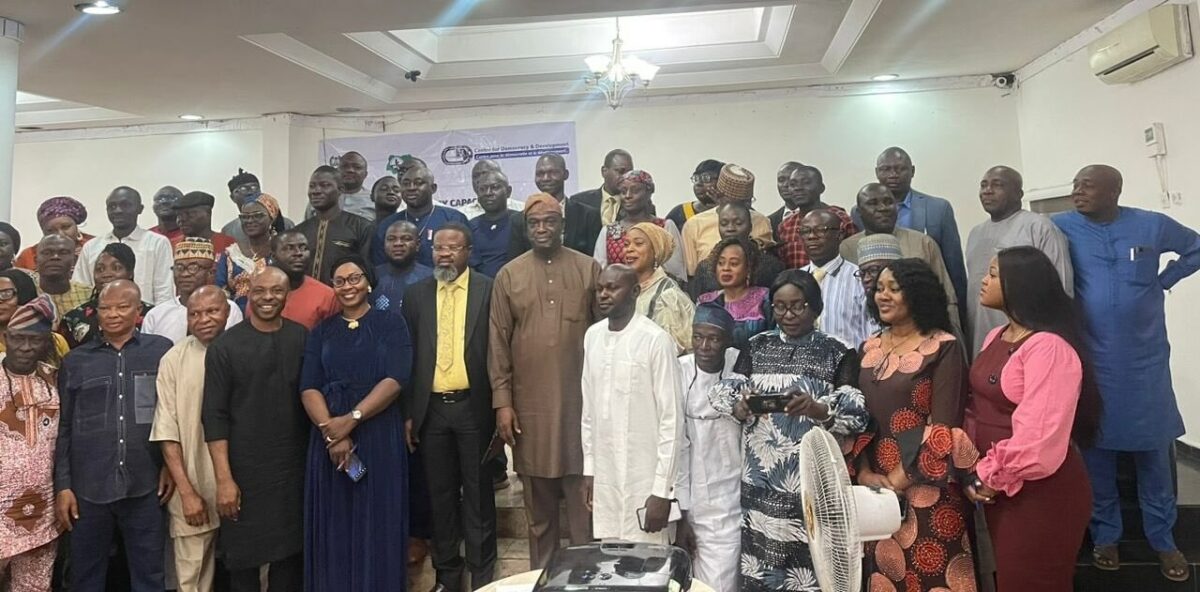2023: Media Urged To Shun Ethnic Discrimination As INEC, CDD Train Journalists On Election Reporting
As Nigeria prepares for its 7th general election since the restoration of democracy in 1999, the Centre for Democracy and Development (CDD) in collaboration with the Independent National Electoral Commission (INEC) and the Nigeria Union of Journalists (NUJ) has trained journalists in the country’s six geopolitical zones on ‘Conflict-Sensitive and Election Reporting’.
For the North-Central segment, a two-day capacity building was held for journalists and members of Civil Society Organisations at the Grand Cubana Hotels, Abuja.
Advertisement
The Deputy Director of INEC’s ICT Department, Lawrence Bayode, apprised journalists of how the Bimodal Voter Accreditation System (BVAS) works to enable them to educate the electorate on the workings of the device and what to expect during the February 25 and March 11 national and state elections.
Participants were also acquainted with key areas in the 2022 Electoral Act by officials from the commission’s legal department.
During one of the sessions, CDD trained attendees on the use of some tech tools for fact-checking to enable them to counter disinformation before, during, and after the polls.
The NUJ President, Chris Isiguzo, while delivering his presentation on ‘Role of Media in the Conduct of Peaceful Elections’, reminded journalists that they have the responsibility of ensuring that their reportage is devoid of ethnic discrimination and other biases.
Advertisement
His presentation read in part, “In whatever we do as Journalists, it is very necessary to take the issue of peace as a cardinal point and take into consideration the need to be careful so that areas that are already fragile do not explode or implode.
“Peace is a basic requirement in a democracy. No democracy can flourish in the absence of peace. While we concede that it is inevitable to eliminate crises and conflicts from our society, however, it is important if deliberate efforts are made toward conflict resolution and peacebuilding.
“As Journalists, we are expected to develop a thorough understanding of the elections and the electoral process, an understanding of conflicts and convey these to citizens in a way that reflect the truth in all their complexities. The proper foundation established by Journalists will provide citizens with the opportunities they require to make informed judgments about issues involved and perhaps help the government in taking meaningful decisions.
“Media professionals should brace up for the challenges ahead, especially since they are expected to participate in the process of social reconstruction and democratisation by providing a positive and participatory forum for the exchange of ideas, democracy and nation-building and while discharging their duties Journalists should never attempt to deviate from the ethics of the profession because it will not auger well for the nation. Since the role of the media in Nigeria’s emerging democracy is central, media professionals must maintain the highest possible standards in their practice.
“The role of the media in peace promotion or conflict escalation has been heightened by a number of factors which include ownership and funding, editorial policy and the regulatory agencies, therefore it is proper to suggest peace journalism as an instrument in promoting peace and reducing dysfunctional conflict to the barest minimum.
“The media have a vital role to play in nation building, by being active partners in the implementation of the development processes. They are veritable instruments and are therefore central to any input-output functions of any political system. However, there may be constraints of the media in this regard which among others include lack of conducive working environment, mass poverty, poor remuneration and lack of adequate training.
Advertisement
“We are conscious of our professional responsibility to gather, collate, process and disseminate news. Through this role, we act as gate keepers who determine which news material to disseminate especially against the background of the myriads of available news material.
“Using the means of new technology to reach a mass audience, the journalist influences opinions, builds perceptions and mediates among contending social and political forces. We act as mirror for the society to view itself while also influencing social realities.
“Clearly, while we have contributed to the process of democratic sustainability in Nigeria in the past 23 years or thereabout, we are also interested in its future. Therefore the 2023/general election is important to all journalists especially because it will further stabilise our democracy and strengthen the democratic culture in Nigerian.
“The NUJ is committed to improving the ethical standard of news reportage during elections. We are keen in ensuring that Nigerian Journalists undertake their professional duties within the ambit of the Electoral Law and other regulations. Professionally, we desire to improve the news judgment of the journalist as it affects elections and elections related issues.
“Media Professionals should be actively involved in the Pre-voting stage during which electoral frameworks may be developed or refined and boundaries may be defined to ascertain voter eligibility. During this phase, voter and civic education, Voter registration, party nominations, and electoral campaigns also take place.
“The process of voting where citizens come to cast their votes is also very important for the media to be active participants. In addition to the casting of votes, this phase also includes vote counting and the verification of results. It is therefore another critical stage where the attention of Journalists is very key. It is the responsibility of Journalists to provide the necessary information whether the electoral system is fair and equitable, without ethnic- or regionally-based discrimination.
Advertisement
“The media must always beam their searchlight on the Election management body- INEC to ensure that it is impartial and competent, that it embraces transparency and inclusivity in its composition and mandate in order to discharge its duties effectively.
“Other roles of media professionals should include educating voters on how to exercise their democratic rights by reporting on election campaigns through providing equal platforms for the political parties and candidates to communicate their messages to the electorate.”



